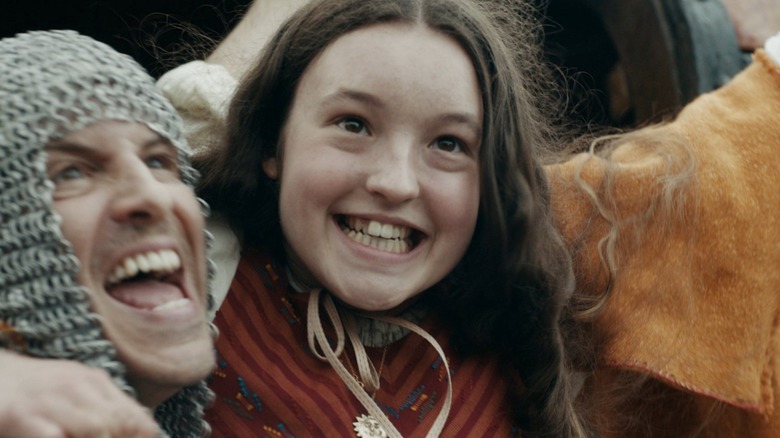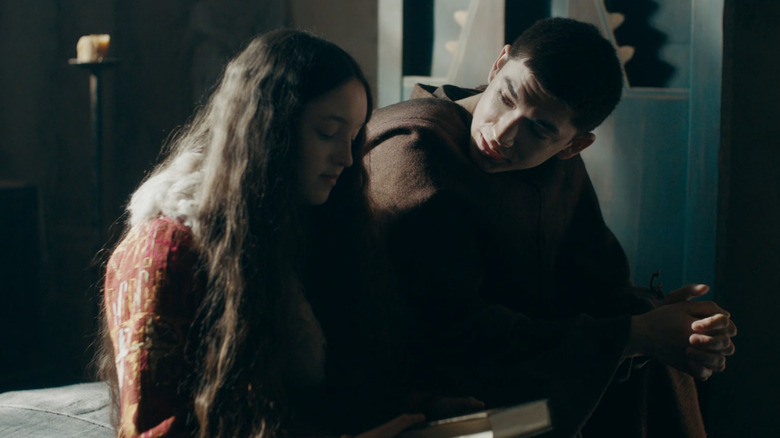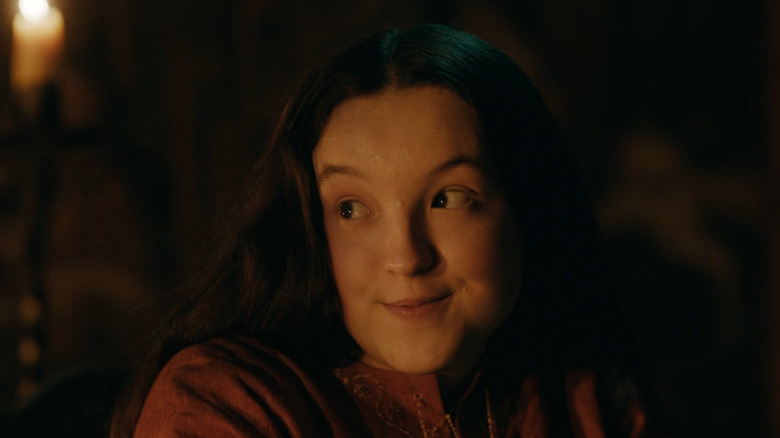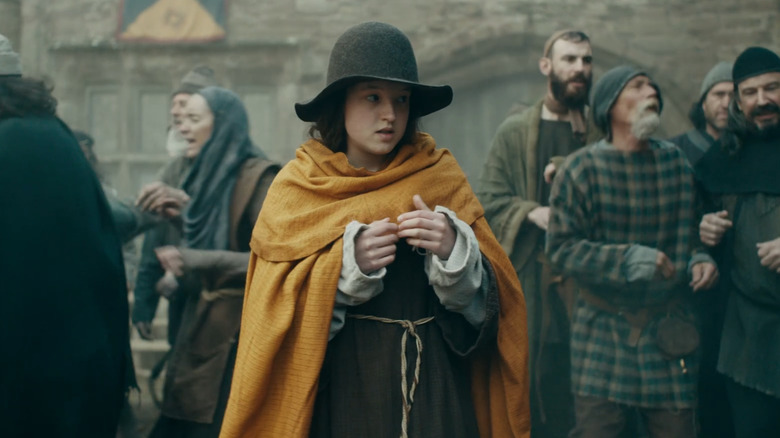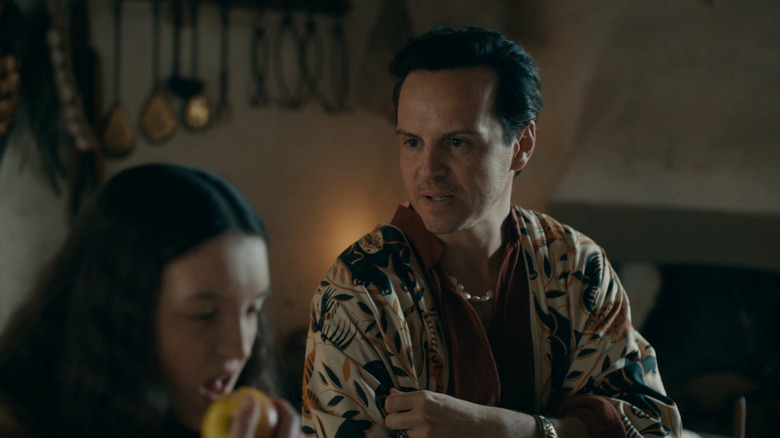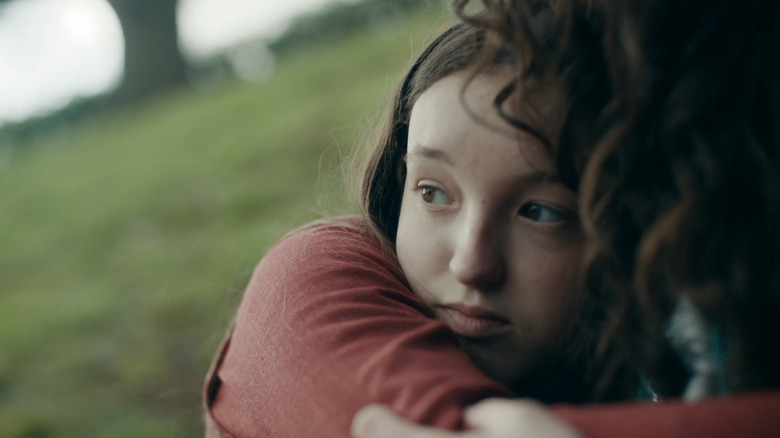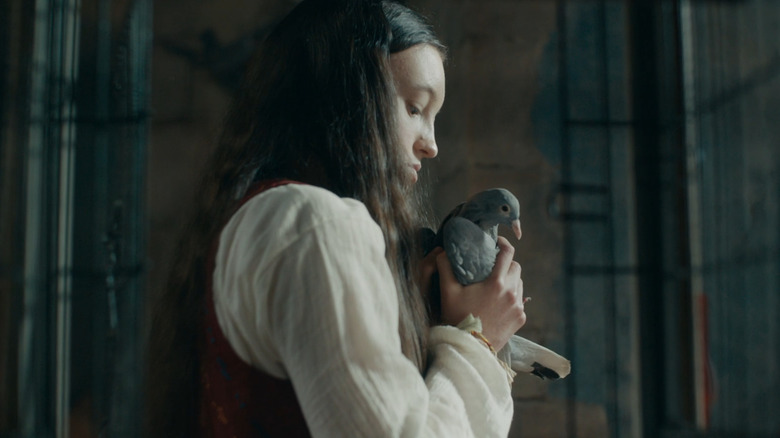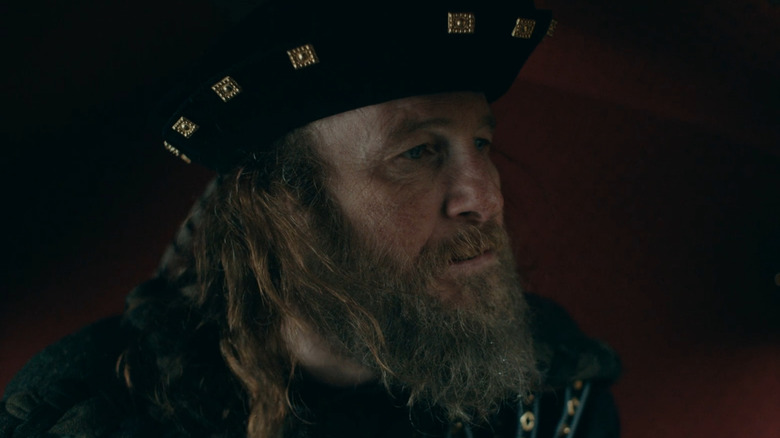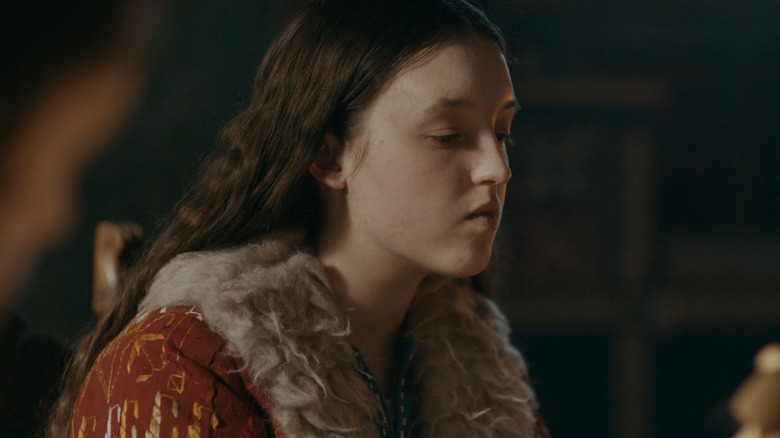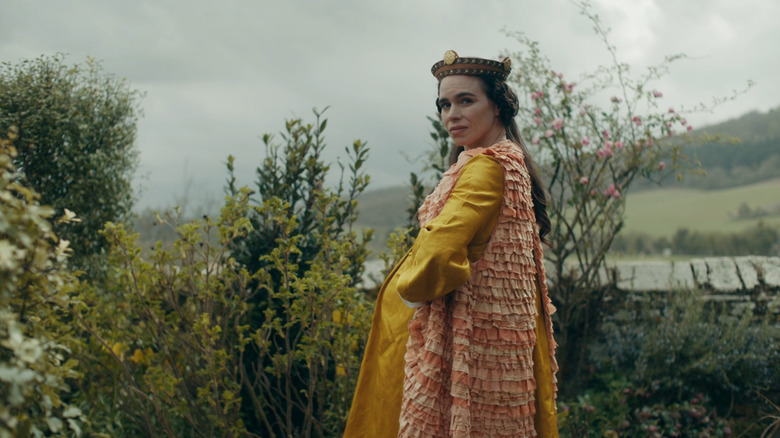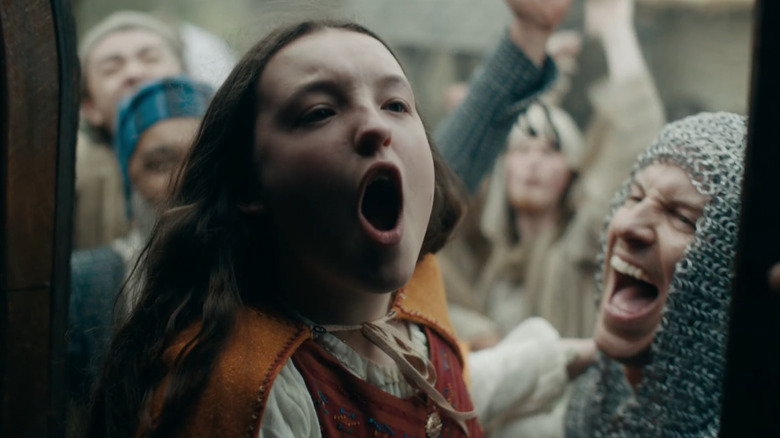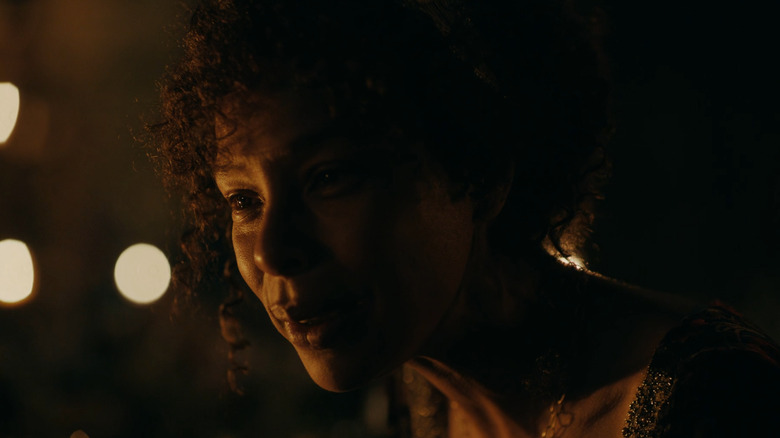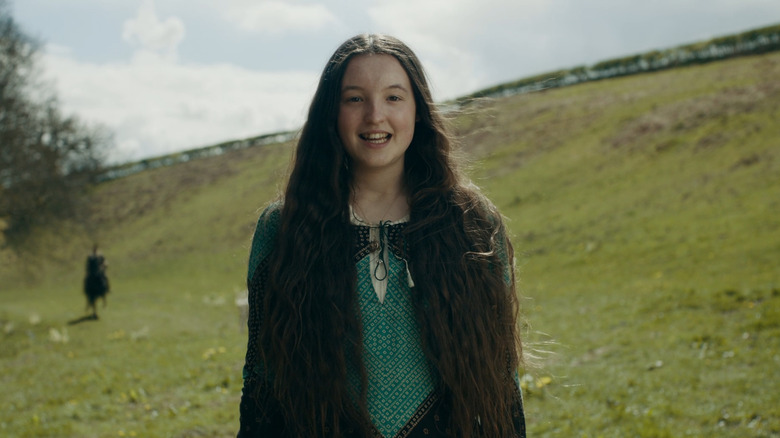The Ending Of Catherine Called Birdy Explained
Contains spoilers for "Catherine Called Birdy"
"Catherine Called Birdy" is a coming-of-age story set in medieval England. The protagonist is Catherine (Bella Ramsey) — but everyone calls her Birdy — a 14-year-old girl who just began menstruating, which means she's old enough for her father (Andrew Scott) to marry her off to some rich suitor who can pull them out of debt with a hefty marriage purse. It's about how the way of life for young women in the 13th century isn't, at its core, all that different than it is in the modern day — although massive strides have obviously been made since then.
Directed by Lena Dunham and based on the children's novel by Karen Cushman, the film explores the similarities between Birdy's teenage life (spent living in a manor with servants and a nanny) in the middle ages and that of any modern-day teenager (without the manor and servants, probably) by emphasizing the importance of friendship despite societal differences and taking the time to find your place, rather than doing what everyone else expects of you.
Aside from the setting and some dialogue, most of the film is remarkably easy to relate to (regardless of your gender) which makes for a rewarding viewing experience. However, the ending is not conventionally satisfying, which may leave some audience members feeling a little disappointed or even confused. So we are going to go through the themes at play to shed a little more light on Birdy's journey of self-discovery.
In the hands of God
When Birdy introduces herself to the audience at the start of the film, she mentions that she lives in a village called Stonebridge, which is located in Lincoln, which is part of England, and it all resides "in the hands of God." The Almighty looms around the edges of the film, peeking in whenever possible to remind everyone of their position in the world. At this time (1290), Christianity was just a part of life for everyone and the presence of God was ubiquitous.
This is important to remember because this belief structure is partially responsible for the situation Birdy finds herself in. When we first meet her, she is perfectly in her element, disrupting the raising of a cottage by playing in the mud with everyone else, despite her status as a young lady. As the film continues, she becomes increasingly more uncomfortable as the social norms surrounding her (many of which are a result of religious beliefs) begin to take hold.
Her favorite sibling, Edward (Archie Renaux), dedicated his life to God and lives as a monk in a nearby abbey. Despite the fact that he's never around, he understands her better than anyone and urges her to always read and learn, thus insuring she remains independent as opposed to a cog in the patriarchal machine.
The privileges of lords and ladies
Right away, Birdy lets us know exactly how she feels about her parents by saying that her father, Lord Rollo, is vain, drunk, and greedy, while her mother, Lady Aislinn (Billie Piper of "Doctor Who" fame), is wise of spirit and fair of face. Much of Birdy's existence revolves around rebelling against authority figures (like her father) and showing love and compassion to those she believes to be kind and wise (like her mother and her friends). So when Lord Rollo starts acting kindly to her, she is immediately suspicious.
Of course, she has good reason to be. He and his wife had been trying to have another child for years, and each one died during labor. His way of dealing with the heartbreak was to drink and spend ridiculous amounts of money (like buying a tiger who died before it even arrived at the manor), so the family is out of funds and desperate to make money. This perfectly sets up Rollo's third-act turn, where we discover he isn't as selfish as anticipated.
It's also important to remember that lordship and ladyship are powerful titles that can be wielded to help people, or held onto like a shield to keep those with lesser (or no) titles or privileges away from you. The movie is very clear that titles are an arcane construct that actually says nothing of a person's character.
Birdy comes of age
As mentioned in the intro, Birdy's life starts to change dramatically once she has her first period. Since it's very likely that no one ever discussed menstruation in any detail with her, she naturally assumes she's dying. Her nursemaid, Morwenna (Lesley Sharp), informs her this is the start of her monthly visits from the red lady, and Birdy's existence almost immediately shifts.
She has to learn how to use pads (which are just rolled-up fabric) and treat cramps, both of which are horrific experiences that she disapproves of. The real problem is that this means she is physically (while not mentally) able to start having children. That is the role her medieval society has carved out for her. Even her mother, who is usually content to let her daughter be a free spirit, starts talking about her responsibilities as a woman.
In an attempt to deny her newfound womanhood, Birdy tucks the rags in a crack between the outhouse floorboards, but they're still discovered. It's not so much that Birdy hates being a woman — it's that her gender significantly limits her from seeing the world, fighting in the crusades, or spreading her metaphorical wings and flying.
Lord Rollo needs to marry off Birdy to save the family
Lord Rollo is not a financially responsible man. He claims to have been so distraught over several child deaths that he needed a little joy in his life, which means drinking a lot of alcohol and buying nonsensical things that don't do the family any good. This has led to a dire situation where the family needs to find a wealthy man willing to marry Birdy.
Marriage isn't about love in the 13th century, certainly not to nobles. For Lord Rollo especially, it's solely a financial decision. Ethelfritha Rose Splinter of Devon (Sophie Okonedo) breaks it down to Birdy fairly simply when explaining that she doesn't believe her husband, Birdy's uncle George (Joe Alwyn), actually loves her. She sees marriage as a way for a woman to use their "purpose" to their benefit. In her case, this means finding a young man to keep her safe while giving him some money and a title.
Birdy wants to avoid marriage in all its forms, it seems. The fact that her father chooses to use her like currency to make up for his past mistakes only adds insult to injury. This is a young woman who doesn't want to be tied down, period — let alone to benefit someone else. Thus, her decision to get married in the end is a huge step for her character.
Birdy pushes her friends away
Birdy's best friends are Perkin (Michael Woolfitt), a boy who takes care of goats (and passes a lot of gas) whom Birdy considers to be her "heart's brother," and Aelis (Isis Hainsworth), whom Birdy describes as the prettiest girl in the shire and her dearest friend. In terms of status, Aelis outranks Birdy because her father is Lord Gideon Sidebottom (David Bradley), the oldest man in his province, who is also richer than her parents. They both outrank Perkin, but that doesn't stop them from being friends.
What does stop them, however, is Birdy's greed. The only man she has a crush on is her uncle George (she's 14 — it was a different time), and when her friendship with them threatens to change the way he sees her, she pushes them away. When George is smitten by Aelis, the two begin courting. Although it doesn't lead anywhere, Birdy's jealousy breaks her friend's heart, and they go quite some time without speaking. When Perkin, dressed as a ghost on Halloween, tries to get Birdy to pretend to be afraid of him in front of George, she treats him like a child, embarrassing him.
It's only later in the film, when she recognizes the errors of her ways, that she's able to be friends with them again. She even offers to throw the rest of her life away so her brother Robert (Dean-Charles Chapman), who constantly annoys her, can marry Aelis.
Birdy's role in medieval society
Birdy likes to point out all the things girls can't do because the list is excruciatingly long and she is understandably very upset by it. Her brother Edward gets to live as a monk, and his only responsibilities are to honor God. Her uncle George got to fight in the crusades (a fact she idolizes without fully understanding), and her father gets to spend all the money he wants and force his daughter to clean up his mess by forfeiting her future. All girls really get to do (from her point of view) is serve men.
She isn't entirely wrong here, but she has allowed this fact to blind her from all the things girls can do to make their lives, and the lives of those around them, better, with what little agency they're allowed in this period. For instance, looking after the people they love with more attention to detail than their male counterparts. This doesn't mean parenting or babysitting, but rather taking the time to understand what people need.
Birdy cares more about what people can do for her rather than what she can do for them. Perkin even calls her out for never asking what his hopes and dreams are. Since she isn't expected to fight wars, govern land, or devote herself to God, she can be part of other people's lives and help improve them. Is that fair? No, but as she realizes over the course of the film, it is very useful.
Lord Shaggy Beard of doom
Once Birdy is informed that she must marry someone to save the family from financial ruin, she encounters a long line of potential suitors, and none of them fit the bill. She uses her cunning (a trait she says most women share and should be celebrated for) to find ways of tricking them into stepping away from the proposed marriage. The only suitor this doesn't work on is the seventh-richest man in Yorkshire, who loves to indulge his carnal desires. This is Sir John Henry Murgaw aka Shaggy Beard (Paul Kaye).
He makes a strong impression the first time we see him by breaking wind in someone's face at a feast, announcing his status, and telling everyone how badly he wants to fornicate. Birdy had chased away other suitors so effectively that he is the only one left willing to marry her. When he claims to hate criers, she cries, but that doesn't discourage him. The thing is that Shaggy Beard "likes the chase." So the more she tries to escape, the harder he will pursue.
Since he's a rich man who knows how badly Birdy's family needs the money, he gives her a purse filled with silver all her own and informs her that the second she spends it, she has agreed to marry him. She holds off on spending it as long as she can but eventually resorts to giving it to her brother so he can marry Aelis.
Birdy meets the mitten man
Although Birdy hates the idea of marriage, she is starting to get curious about romance — specifically, kissing. She can try and deny puberty as much as she wants, but it's got her and she's not going to escape. She asks Perkin if he thinks kissing is less gross than they originally thought, but he doesn't really answer her. Later, she encounters a man selling mittens in the night (Jordan Adene). He offers to sell her some, but she doesn't have any money.
He suggests that she grant him a kiss instead. Earlier, she would have found some way to scare him off, but with all this talk about womanhood and marriage, she's become curious. So she agrees to the kiss. He presses his lips against hers, but she doesn't respond in any way, leaving him looking a bit confused (though she interprets it as pride). This scene indicates that Birdy is ready to start considering romance, but she's still too young and inexperienced to actually participate.
Just because she is physically able to explore that side of life, she hasn't had enough life experience to properly contextualize and understand what that means. This fact is obvious to us, but it takes the other characters in the film much longer to see it, resulting in the final duel.
Birdy gets two baby sisters
Things start to change for Birdy a second time when her mother gives birth to twins. By the time Rollo announces Lady Aislinn is pregnant again, they have lost so many children during labor that his wife's life is at risk. Birdy becomes so furious at the idea of her father's willingness to inadvertently end his wife's life that she confronts him in front of her potential suitor and sets the outhouse on fire while the suitor's father is using it.
This is just another example of how society views a woman's sole purpose to be bearing children. However, when the labor starts going sideways and it looks like the child won't survive, Rollo steps up and orders everyone to continue working while he adoringly coaches his life through the process. He admits that he refuses to lose her and another child and demonstrates just how much he loves her and unselfish he can be.
Though he was hoping for a boy, he gets twin girls instead. Seeing him support her mother like that and watching him dote over his new daughters convinces Birdy that her father isn't quite as bad as she thought. It also opens her eyes to the importance of helping others in need and gets Rollo thinking about his own mistakes.
Lord Rollo fights for his daughter
To her shock, Birdy discovers that her older brother, Robert, intends to marry her dearest friend Aelis. She may loathe her brother, but the idea of Aelis becoming her sister is simply too good to pass up. She travels to her house to celebrate but learns that her father denied the marriage because his daughter is still a virgin (a doctor confirmed this) and suitors will pay more for virgins.
Enraged, Birdy decides to take the purse Shaggy Beard gave her and give it to Robert. With that money, he is able to afford Lord Gideon's asking price and marry Aelis. However, since Birdy spent that money, this means she is forced to marry Shaggy Beard. She rides away with him in a carriage, grimacing at his disgusting habits and illness, before her father chases them down and demands to have his daughter back.
The birth of his new daughters and the selflessness with which Birdy gave herself up to help Robert inspired him to do the right thing and keep Birdy at home. Since they already entered into an agreement, Rollo is forced to fight in a duel with Shaggy Beard, but when the old man tries to cheat, Birdy is given back to her father. For perhaps the first time, she actually appreciates being part of his family.
Birdy spreads her wings
Everyone calls Catherine Birdy is because she has pet birds. We don't see them a lot, but they're clearly very important to her. Besides, you don't have to see them in every scene to understand the symbolism.
Birdy feels trapped. She even frees a bunch of pigs to prevent them from being sent to the slaughter because she doesn't want any animal to live a life of captivity like hers. She wants to go out and experience everything life has to offer but feels like she isn't allowed to — hence all her rebelling and acting out.
Ethelfritha points out that Birdy has wings and that she needs to learn how to master them or she will fall to her death like a bird in captivity. At the end of the film, when Birdy feels so overjoyed to be back with her family and not marrying Shaggy Beard, she sets her birds free. One of them has been in her care so long that it doesn't make it very far before falling to the ground. One could read this as the film commenting on the fact that Birdy (and women in general) spend most of their lives being denied things that when they're sudddenly sent out into the world, they lack the skills to fly.
Birdy gets a happy ending
In the climax of the film, everyone is pairing up except for Birdy. Aelis is married to Robert, Morwenna is kissing the carriage driver she has secretly been pining for, and even Perkin has a close male companion who may serve as a romantic partner in the future. Birdy looks at all of them with pride, happy to see others enjoying their lives, rather than mourning her situation.
Birdy is now content to continue reading, writing to Edward, and helping to raise her sisters to be like her and to run as far as they can in life. In a way, she has learned to be the change she wants from the world. She can't change everything all at once, but she can use her status to influence and inspire others, while also just loving and caring for her friends and family.
The final shot of the film is Birdy looking directly into the camera as a blurry figure approaches on horseback, indicating that while she escaped Shaggy Beard, others will still seek to marry her, and she might even find someone whom she can both love and respect.
